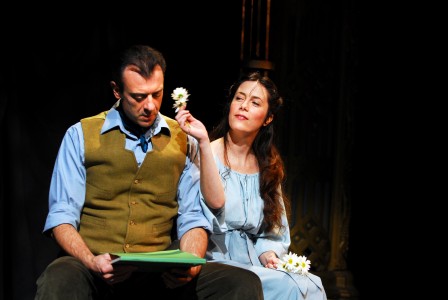By: Darryl D’Souza

The Madonna Painter, currently playing at Factory Theatre, is an exceptionally well-written play. It also features: a very capable cast all of whom deliver strong performances, unusual but nonetheless wonderful sound effects, and high contrast lighting. To call The Madonna Painter a masterpiece would certainly not be an exaggeration. It has something, an almost magical quality, that, particularly at the ending, made me feel like I was watching something so incredibly beautiful that I couldn’t fully comprehend it.
The Madonna Painter had brief moments that made me feel like I do when I watch a great opera – it felt like it was so beautiful that it was meant to be experienced rather than understood. Incidentally, the play does feature some opera. One unusual sound was several operatic voices speaking very softly simultaneously, producing a wonderful effect.
The Madonna Painter gives the audience a great deal to think about. It has been billed as topical, since it concerns the outbreak of Spanish Flu in a Quebec village near the end of WWI, a modern parallel with the H1N1 pandemic facing Canada today.
But this play is about so much more than just a potentially deadly disease threatening a French Canadian town. It has a darkness and perversity that is reminiscent of a David Lynch film. It has references to necrophilia, incest, and a sadistic doctor that one character accurately states is: “more of a butcher than a doctor”.
The play, as the title implies, is about an Italian painter famous for painting the Madonna, commissioned by the Priest (albeit with the butcher doctor’s money,) to paint a triptych of the virgin Mary to ward off the pestilence spread by the Spanish flu. The Italian Madonna painter always chooses as his subject a local virgin from the village as the model for his Madonna. The Italian Madonna painter named Alessandro is somewhat of a racist stereotype, not quite as racist as Chico Marx was in the thirties, but not as funny either.
This is not a ‘comfortable’ play, but what made me feel most uneasy wasn’t the allusions to perverse sex with relatives or corpses, (probably because my sense of moral decency has been eroded by “Art cinema” over the years,) but the division that French-Canadian playwright Michel Marc Bouchard sees between Anglophone and Francophone Canada. Being a Francophile who, like most English speaking Canadians, cannot say more than a few words in French I must acknowledge some differences exist, but Michel Marc Bouchard (like another famous Bouchard named Lucian,) sees Canada as a country very much divided in two on linguistic terms.
Michel Marc Bouchard has English speaking Canadians performing what I consider to be the very fascist-like task of gathering up French Canadian pacifists/cowards who refused to fight in WWI and arrest them. I don’t know about the historical authenticity of this event, whether French Canadians really were arrested by Anglophones for not participating in WW1, or not. What seems more important is the modern analogue with our present war in Afghanistan. I got the impression that Michel Bouchard sees English speaking Canadians forcing the French Canadians to fight in a war they want nothing to do with, and this may be the real significance of his use of WW1 in this play.
Don’t let the politics or the perversity scare you off, I assure you that you can quite easily overlook both. The Madonna Painter like any great work of art is multifaceted, I’m sure you will find something to love about it, in fact probably quite a few things.
Details:
–The Madonna Painter is playing until Dec. 13 at Factory Theatre (125 Bathurst Street).
-It plays Tuesday through Saturday at 8 p.m. with a Matinee at 2 p.m. on Sunday Dec. 13.
-Single tickets run $15-$35 (discounts for seniors, students, or theatre artists as well as groups of 10 or more) and Pay-What-You-Can Sunday.
-Tickets may be purchased online at www.factorytheatre.ca 24 hours a day, or by calling (416) 504-9971, or visiting the Factory Theatre Box Office in person.
(Photo Courtesy of Factory Theatre Website)
